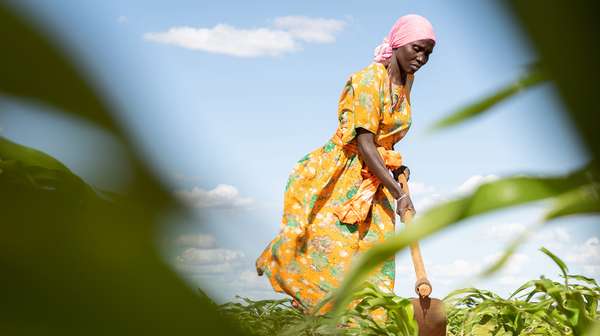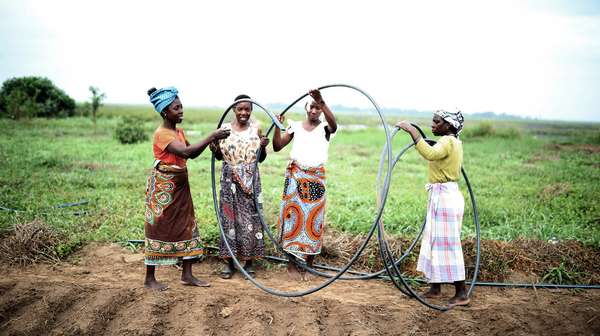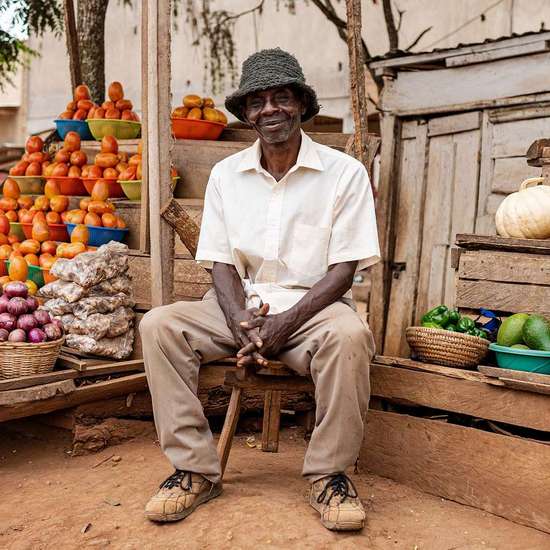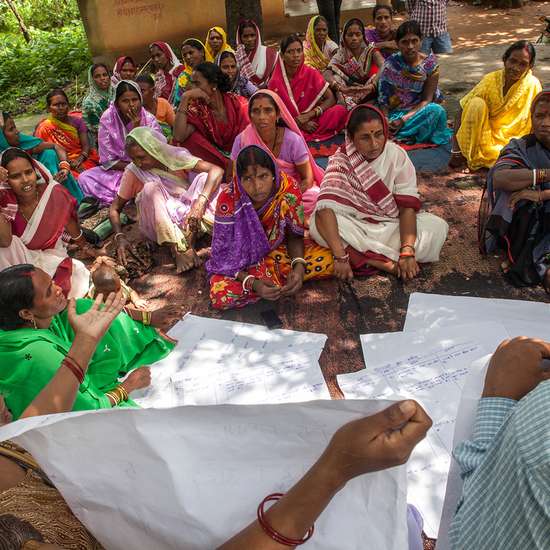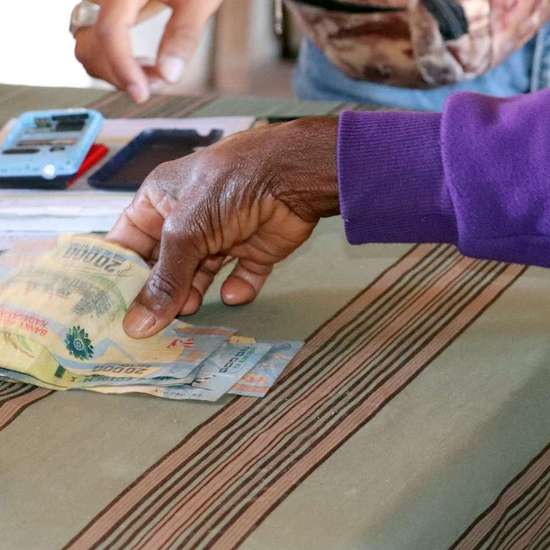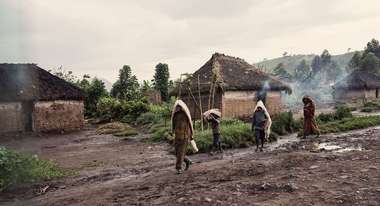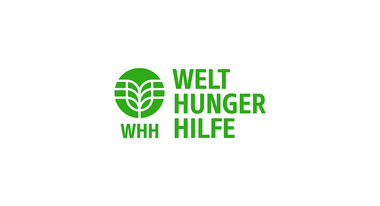All the latest figures, an interactive map, and every GHI report from recent years.
The United Nations' 17 Sustainable Development Goals
In 2015, the United Nations drew up 17 Sustainable Development Goals to set the course for the future of our world. With the 2030 Agenda, 193 countries have committed to ensuring that all people can live in dignity by 2030 while at the same time preserving the natural foundations of life in the long term, whether social, economic, or ecological.
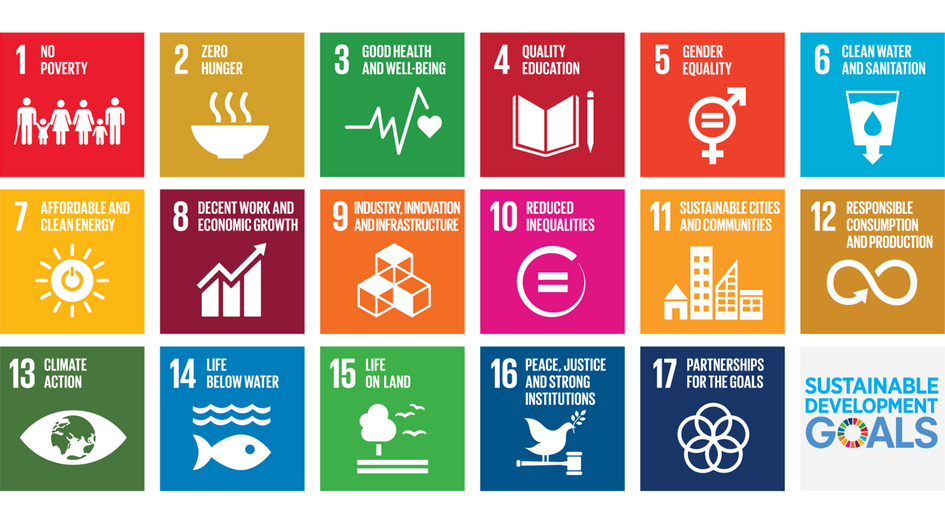
The 17 Sustainable Development Goals (SDGs) concern everyone: governments worldwide, civil society, the private sector, academia, and individuals. There has been some progress in recent years, but substantial challenges remain.
Striving for development and a sustainable future
The United Nations (UN) 2030 Agenda and its 17 SDGs include 169 targets. Together they provide a holistic framework for achieving a sustainable society globally. The SDGs are a call to action for all countries worldwide to foster prosperity while protecting our planet. Therefore, the targets include tackling poverty and strategies that address people's social needs, such as health, education, social protection, and employment opportunities.
At the same time, the global community must address the issues of climate change and environmental protection. The SDGs also provide a critical framing for COVID-19, as thepandemic has highlighted the extent of global inequalities and exposed the failures addressed in the 2030 Agenda for Sustainable Development and the 2015 Paris Agreement on climate change.
The 17 SDGs are in jeopardy
Countries have been working since 2016 to translate the shared vision for fighting poverty and reducing inequalities into National Development Plans (NDPs). Achieving the 17 SDGs by 2030 requires a focus on the priorities and needs of the world's most vulnerable populations and countries.
However, according to the latest report on the state of implementation of the SGDs, the2030 Agenda goals are in jeopardy – mainly due to ongoing and interconnected global crises: For example, the war in Ukraine, which is exacerbating food, humanitarian, energy, and refugee crises; as well as the impacts of the COVID-19 pandemic and climate change.
SDG 2 "Zero Hunger": Ending hunger by 2030
Millions of people still live in extreme poverty and suffer from hunger – worldwide, an estimated 735 million people are going hungry. Welthungerhilfe (WHH) is working to end global hunger and achieve sustainable food security. We aim to end hunger in the regions we work in, i.e., achieving "Zero Hunger" by 2030.
The devastating effects of multiple crises mean achieving the second SDG is increasingly uncertain. The Global Hunger Index (GHI) 2022 shows evidence of this. Hunger levels are dramatic in many global regions and are likely to worsen.
South Asia and sub-Saharan Africa are the regions with the worst hunger levels. They have the highest rates of child growth stunting and by far the highest rates of child wasting, undernourishment, and mortality. For example, India's GHI score is "serious." The country's 19.3% child-wasting rate is the highest in the world.
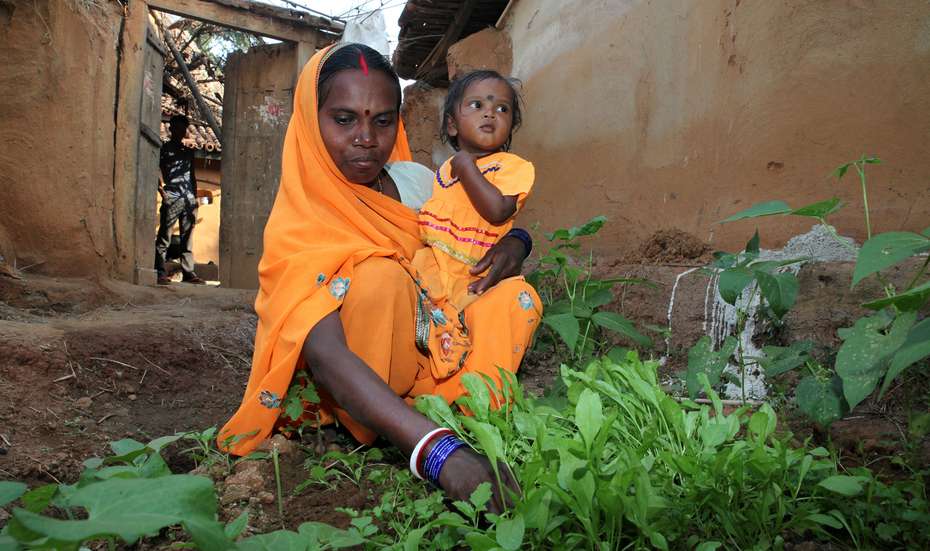
Drastic policy changes are needed to ensure the second SDG – "Zero Hunger by 2030" – does not become unattainable. Ending hunger means, above all, enabling all people to sustain a nutritious diet and not just fill their stomachs.
Ending hunger worldwide is a mammoth task. Achieving sustainable success requires global food system transformation and innovative approaches to both acute emergency relief and long-term development, particularly concerning sustainable and resilient food systems.
In 2021, WHH supported around 16.6 million people in 36 countries through 526 international projects. In concrete terms, this means improved nutrition for many people due to sustainable harvests. Moreover, better access to clean drinking water and toilets has reduced the risk of illness for these people. They also have more opportunities to earn income and surpluses and to start vocational training. Finally, through our support, children can develop better mentally and physically.
The 17 SDGs at a glance
Goal 1: No poverty
Eradicating extreme poverty for all people everywhere by 2030 is the first goal of the 2030 Agenda for Sustainable Development. The COVID-19 pandemic, the war in Ukraine, and rising inflation and its effects have set progress far back in poverty eradication.
Estimates suggest that compared to pre-pandemic projections,the crises will result in an additional 75 to 95 million people living in extreme poverty in 2022. In low-income countries, the losses are much greater, with poverty reduction set back by about eight to nine years.
How is poverty measured? According to the World Bank's definition, a person is below the poverty line if they live on less than 1.90 dollars a day. For the first time in two decades, the proportion of workers living with their families below the international poverty line has risen from 6.7% in 2019 to 7.2% in 2020. Another eight million workers have been pushed into poverty.
Goal 2: Zero hunger
Worldwide, 735 million people are going hungry, although there is enough food, resources, and knowledge for everyone. Moreover, all people have a right to food. WHH uses diverse strategies that aim to achieve the second SDG, "Zero Hunger by 2030".
The COVID-19 pandemic has driven an estimated 150 million additional people into hunger. The outlook of the current World Hunger Index 2022 confirms the negative development: the trend is clear that hunger levels could increase. Global hunger levels are almost back to the level they were at when UN member states adopted the 2030 Agenda for Sustainable Development. Intensified efforts are required to achieve the second SDG.
A transformation towards a just, sustainable, and resilient global food system is required. Such a transformation needs effective policy direction on the one hand and adequate financing on the other. According to estimates, the international community must provide 39-50 billion dollars annually to eradicate hunger. Germany's contribution would have to increase by about 1.3 billion euros.
Goal 3: Good health and well-being
Health is the prerequisite for prosperity, social participation, and social cohesion, but also the outcome and indicator of economic, social, and environmental dimensions of sustainable development. In many countries, good health care is still not a standard.
The global inequalities in healthcare systems have become particularly visible due to the COVID-19 pandemic. The pandemic has led to the disruption of basic health services and an increase in depression and anxiety. Global life expectancy has declined, as has progress in combating tuberculosis, HIV, and malaria, for example.
In our projects, we work with our project partners to provide functional and effective health care. For example, we support the construction of health centers and maternity wards, create safe water supplies, and implement hygiene measures. Moreover, we provide training for healthcare workers, government employees, and civil servants.
Goal 4: Quality education
Education gives people the knowledge and skills to stay healthy, find work, and build tolerance. Education and building labor markets in poverty-stricken regions are central to development, economic growth, and climbing out of poverty and hunger, especially in the Global South, for example, in Asia and Africa.
Worldwide, a quarter of a billion children and young people have no access to education. In cooperation with Bauer Charity gGmbh at the initiative of Gudrun Bauer, WHH has launched the cross-national Skill Up! training program. It offers around 22,500 young women and men between the ages of 15 and 35 in Kenya, Sierra Leone, Uganda, India, Tajikistan, Nepal, Malawi, and Afghanistan the chance to gain professional qualifications.
Goal 5: Gender equality
Gender equality is a human right and a necessary cornerstone of a peaceful, prosperous, and sustainable world. While there has been progress in recent decades, the world is unlikely to achieve gender equality by 2030. Violence against women remains pervasive.
Millions of women globally continue to be discriminated against or oppressed, especially regarding access to education or health care. They are still victims of human trafficking and sexual or physical violence. Many countries are still far from achieving gender equality, including in the Global South.
Gender equality is crucial for social, political & economic development. Far-reaching measures are needed to accelerate progress toward equality. WHH is committed to women's empowerment in its projects to promote gender equality. For many years, our work has supported women's self-determination in claiming their rights.
Goal 6: Clean water and sanitation
Access to clean water, adequate sanitation, and hygiene are human rights and the foremost human need for health and well-being. According to the UN World Water Report 2021, there is a significant risk that billions of people worldwide will still lack access by 2030 if progress does not quadruple.
Globally, more than two billion people do not have access to residential water that is free of contamination and readily available when needed (safe water supply). Approximately 3.6 billion people do not have access to toilets not shared with other households and from which wastewater is safely treated and disposed of (safe sanitation).
Germs or other substances often cause water contamination. The result is disease spread, mainly affecting people in countries of the Global South, especially children, who suffer from diarrheal diseases.
Water demand is increasing due to rising population growth, urbanization, and the growing water requirements of industry, energy, and agriculture. Many countries in the Global South also face other challenges: Climate change is causing water shortages, for example, and there is insufficient investment in water and sanitation.
WHH is committed to improving access to sustainable water supplies. With so-called WASH projects (Water, Sanitation & Hygiene) in Southeast Asia and Africa, we help with various measures, e.g.,
- establishing a sustainable drinking water supply.
- installing toilets and washing facilities.
- educating people about hygiene and hand washing.
- providing training on sustainable waste disposal and waste management.
To ensure that people benefit long term, we implement our projects so the local population can continue them even after the projects have ended. WHH takes a systemic approach, focusing not only on the "hardware" such as wells, toilets, and washing facilities but also on the "software".
The idea is to work with governments, civil society, and the private sector to lay the basic building blocks to sustain these structures. These blocks include institutions, planning, legal frameworks, maintenance, and management. In this way, water and health services can reach more people long term.
Goal 7: Affordable and clean energy
SDG 7 focuses on access to clean, affordable, and reliable energy. Energy is central to the development of the economy, agriculture, health care, education, communications, and transportation. The critical factor for climate and environmental protection is clean energy sources. However, most of the energy generated worldwide still comes from fossil fuels.
There are still large disparities in access to modern, sustainable energy. Approximately 800 million people worldwide lack access to a modern energy supply. Due to rising energy and raw materials prices worldwide, the cost of manufacturing and transporting wind turbines, photovoltaic modules, or biofuels, for example, have also increased enormously.
Especially in poorer countries, a lack of energy makes everyday life more difficult. People depend on electricity – e.g., to cook or refrigerate. But also hospitals, schools, and people in agriculture need energy sources. To achieve SDG 7 by 2030, there is a need for continued political support and capital for clean and renewable energy, especially in the countries of the Global South.
In our projects with local partners, we support, for example, the construction of solar plants, energy-saving kilns, or local small hydropower plants, which enable people to overcome the energy crisis and sustainably remove an obstacle to development.
Goal 8: Decent work and economic growth
Through SDG 8, the international community aims to promote sustainable economic growth, decent work, and full employment for all by 2030. Globalization offers great opportunities for economic progress, but still, the disparity between countries is huge.
The COVID-19 pandemic has threatened the global economy and endangered or destroyed the lives of billions of people worldwide – through fluctuations in financial markets, falling commodity prices, and increasing insecurity. Some 1.6 billion informal workers still face poverty, and the risk of exploitative child labor has increased. According to the International Labor Organization (ILO), around 79 million children work under dangerous conditions.
WHH relies on the positive effects of a sustainable and inclusive market economy to identify and establish new sources of income for and by people in structurally weak regions. Based on expert guidance, we help them develop modern supply and value chains in the service, agricultural or commercial sectors.
Local supply chains are crucial to strengthening the inclusivity of market systems. They boost regional economies and can lift vulnerable people out of poverty and malnutrition. Collaborations with the private sector also play a role. We call upon many years of experience to make social and inclusive entrepreneurship a strategic pillar of our work.
Goal 9: Industry, innovation and infrastructure
Sustainable and inclusive industrialization combined with innovation and infrastructure can unleash competitive and dynamic economic forces. These generate income and employment and are critical to introducing and promoting new technologies. Likewise, they enable the efficient use of resources and facilitate international trade.
However, growth in manufacturing has been steadily declining worldwide, especially in countries of the Global South. Due to the COVID-19 pandemic, manufacturing output fell by 8.4% as global supply chains collapsed.
Above all, the pandemic highlighted the urgent need for resilient infrastructure. According to the Economic and Social Survey of Asia and the Pacific (ESCAP), additional investment of around $434 billion annualy is needed to make infrastructure resilient to climate change and disasters.
WHH leverages global partnerships and social entrepreneurship to make services and products accessible locally to people living in poverty. Innovative projects help create sustainable livelihoods for people and fight hunger.
The focus is, for example, on innovation labs or the establishment of social businesses, for example, for vulnerable target groups such as smallholder farmers, which are geared to their needs. But also WASH or other projects support the people in our project countries.
Goal 10: Reduced inequalities
There is an unequal distribution of income and wealth globally. SDG 10 aims to reduce inequalities and ensure no one is left behind by 2030. Due to rising inequality in many countries, it is critical that the income of the poorest populations grows.
Inequality is not only reflected in the distribution of income and wealth but also, for example, in health care, access to education, political participation, and life expectancy. These disparities affect marginalized groups particularly severely.
However, economic growth alone does not necessarily lead to less inequality. To ensure access to health, education, and social security systems for all, countries must combat corruption and the social and political exclusion of disadvantaged people, for example. This is the only way to strengthen social cohesion and reduce inequalities sustainably.
Many WHH projects support people affected by inequality, whether the issue is women's rights, education, poverty, or hunger. Nevertheless, the international community must address the underlying conditions that cause these inequalities. In a globalized world with sufficient food, it is not acceptable that 735 million people still go hungry.
Goal 11: Sustainable cities and communities
SDG 11's objective is to make cities safe, inclusive, sustainable, and resilient. Cities and metropolitan areas are the engines of economic growth. They contribute approximately 60% of the global GDP but are also responsible for about 70% of global carbon emissions and an estimated 60% of resource consumption.
The level of urbanization varies widely around the world. In Latin and North America, it is around 80%, while in Europe it is over 70%. Africa, at 40%, and Asia, at around 48%, are more rural. In Africa, the urban population is expected to triple by 2050, but two-thirds of the infrastructure needed to support this growth does not yet exist.
Increasing urbanization has created more slums characterized by overburdened and inadequate infrastructure and services – for example, water and sanitation systems, hygiene, and waste collection. Air pollution is also on the rise. Worldwide, more than one billion people already live in slums. During the COVID-19 pandemic, this number increased.
Cities are essential to achieving the SDGs. After all, 65% of the SDG targets depend on the actions of local governments, especially regarding the implementation of climate targets and the reduction of emissions. WHH advocates for establishing waste management systems or waste collection and recycling. These systems create employment and counteract the burning of waste in uncontrolled landfills.
Goal 12: Responsible consumption and production
Economic and social progress is accompanied by environmental degradation, which has a destructive impact on our planet. Earth Overshoot Day makes it clear: By July 27, 2022, humans had consumed all the resources the Earth's ecosystem can produce within a year. Our planet is at its limit. We use more resources than are available.
SDG 12 is about doing more with less and doing it better. Decoupling economic growth from environmental degradation, increasing resource efficiency and promoting sustainable lifestyles. Sustainable consumption and production can also contribute to poverty reduction, for example. After all, the consequences affect the people in the poorest countries in the Global South the most. The main perpetrators are the industrialized nations of the Global North.
Consumption and production techniques must change if we want to maintain living standards and enable future generations to do the same. For example, rules are needed at all levels to ensure resources are used responsibly and consciously. Every year, for example, around one-third of all food produced, approximately 1.3 billion tons worth around 1 trillion dollars, is thrown away.
WHH's vision is to achieve food security for all people in the countries we work in, in a way that continues to provide the social, economic, and environmental basis for food security in the future. Our actions aim to sustainably improve life chances in a healthy environment and just society. With the goal that development cooperation will become unnecessary, e.g., through the transformation towards resilient and sustainable food systems.
For example, we work with local partners to implement sustainable farming systems and supply chains in India, restore soil health in pastoral areas in Somaliland to enable sustainable livestock production, store carbon in the soil through sustainable farming practices in Kenya, and ensure sustainable access to nutrient-rich school lunches in South Sudan.
Goal 13: Climate action
Glaciers are melting, sea levels are rising and the global temperature has risen by 1.1°C above pre-industrial levels. The impacts of climate change are here: In Europe, it is mainly farmers feeling the effects, e.g., through reduced harvests. In the Global South, millions of people face livelihood loss due to weather extremes, resulting in hunger, conflict, or displacement.
By 2030, an estimated 700 million people will be at risk of displacement due to drought. Urgent action to address climate change and its devastating impacts is essential to save livelihoods and lives.
2015 to 2021 were the seven warmest years since temperature records began. To limit warming to 1.5°C, global greenhouse gas emissions must fall by 43% by 2030 and to zero by 2050. However, the climate action plans formulated by countries are not enough to achieve the target. According to a study by the World Bank, up to 100 million more people could be at risk of hunger by 2030 if countries do not meet the targets of SDG 13.
In our projects, we support people severely affected by climate change in adapting to the new conditions. For example, in training courses, vulnerable communities learn how to set up protective structures and early warning systems for extreme weather events. Or they learn about farming methods that are adapted to or prevent climate change. They also receive high-quality seeds that are more resilient.
Goal 14: Life below water
Oceans cover 70% of our planet. These oceans drive global systems that make the Earth habitable for humanity. Drinking water, rainwater, climate, weather, coastlines, food, and even the oxygen in the air are all provided and regulated by the ocean. Approximately three billion people depend on marine and coastal biodiversity for their livelihoods.
Estimates put the global market value of marine and coastal resources and industries at three trillion dollars annually, i.e., about 5% of the global GDP. Marine fisheries directly or indirectly employ over 200 million people. Careful management of this critical global resource is a crucial element for a sustainable future.
Currently, pollution is decreasing the quality of coastal waters. Ocean acidification is adversely affecting ecosystem function and biodiversity. And it is also harming fisheries. More than 150 million tons of plastic waste are floating in the oceans. SDG 14 aims to save our oceans and protect biodiversity, which is critical to the health of people and our planet.
Marine protected areas must be effectively managed, adequately resourced, and regulated to curb marine pollution, overfishing, and ocean acidification. These areas should cover 30% of the ocean's surface area by 2030 to sustain our oceans equitably and effectively. This protection would help restore fish stocks and combat illegal fishing.
Such protection requires sustainable and innovative funding for life underwater to the tune of more than $150 billion a year. Moreover, there needs to be a transformation of food systems. Aquatic foods should be integral to diets as they provide nutrition and resource use. WHH works in Sierra Leone, for example, on waste management in the Atlantic Ocean.
Goal 15: Life on land
Extinction threatens around one million animal and plant species. The state of the ecosystems on which we and all other species depend has deteriorated dramatically over recent decades – whether in terms of food security, health, or quality of life. Humans are primarily responsible for this situation. We have altered approximately 75% of the Earth's surface.
Deforestation and desertification caused by human activities and climate change, for example, pose a major challenge to sustainable development. Forests are crucial to sustaining life on Earth and combating climate change. Almost 25 million acres of forest are lost annually – a soccer field every four seconds.
Human impact speeds up the rate of species extinction by about 100 times. Agriculture is responsible for 80% of the loss of biodiversity on land. Failure to achieve SDG 15 will jeopardize the achievement of about 80% of all other SDGs. For example, if we do not preserve tropical forests the 1.5°C target is unattainable. Investing in land restoration is critical to improving livelihoods and reducing vulnerability and economic risks.
WHH's projects focus on agrobiodiversity. Agricultural biodiversity is fundamental to sustainable global food security and human survival. We help drive the adoption and implementation of ecosystem-based strategies to adapt to the negative impacts of climate change in many countries.
Our work aims, among other things, to protect the rights of local communities to land and food and to implement them politically at regional and national levels. Food security for local communities and future generations relies on adequate and sustainable livelihoods.
Goal 16: Peace, justice and strong institutions
Conflict, insecurity, weak institutions, and limited access to justice are major threats to sustainable development worldwide. The UNHCR estimated the number of people forcibly displaced reached 103 million in mid-2022. Approximately 60 million of them are internally displaced. These people flee human rights violations and violent conflicts.
Compared to the situation at the end of 2021, more than 13 million more people are seeking asylum than in the previous year – an increase of 15%. The number of refugees rose to more than 32 million by mid-2022. These numbers show the need to address violence against children, homicide, human trafficking, and sexual violence. Such issues disrupt the peaceful and inclusive societies required for sustainable development.
Civil society and governments must work together in the long term to ensure justice and legal security, reduce violence, combat corruption, and increase participatory processes in political decision-making. Thus, transparent regulations are necessary, such as global birth registration and the creation of independent national human rights institutions.
WHH integrates the other goals of the 2030 Agenda to achieve SDG 16. Therefore, we use the "Humanitarian-Development-Peace Nexus" approach, which integrates humanitarian assistance, development cooperation, and peacebuilding measures. This approach requires us to coordinate with peace actors to implement reconstruction measures in regions reliant on humanitarian assistance.
In development projects, WHH strengthens the resilience of people and communities to increase preparedness for conflict and climate shocks. Integral to this work is cooperation with local civil society organizations to strengthen cohesion. Our projects aim to create political solutions that protect international humanitarian law and, for example, break the cycle of war and hunger – with a particular focus on protection for children and young people.
With respect to debates on migration and refugees, we are committed to finding transnational solutions that improve the circumstances of migration and asylum and provide people with a more secure life.
Goal 17: Partnerships for the goals
SDG 17 is the fundamental condition for achieving all other SDGs. Their implementation requires robust collaborations and partnerships – at global, regional, national, and local levels. These build on principles, values, a shared vision, and common goals that center on people and the planet.
Many countries rely on official development aid. By 2030, a world without hunger will require an additional 40 billion euros of annual investment by the international community. More than ever, international cooperation is needed to achieve the SDGs. Such cooperation would enable the required long-term investment in countries of the Global South.
But a monitoring and review process and incentive structures and regulations also need to be put in place to attract investment and strengthen sustainable development. Fundamental to our work is humanitarian partnerships and cooperation with local actors in the countries we work.
Especially in emergencies or crises, rapid on-the-ground assistance is essential for survival – this is where local organizations play a crucial role. We work together with national and local organizations as well as with numerous international partners.
Our projects strive to contribute to the implementation of the 17 SDGs.
WHH projects support implementation of 17 SDGs
The basis of all measures anchored in the SDGs is the Universal Declaration of Human Rights. WHH's work aims to contribute to the implementation of the 17 SDGs. In the agricultural sector, for example, we create jobs and develop site-specific strategies for sustainable and efficient agriculture with the local population.
In doing so, we pursue three primary goals: Food security for the population, increased income, and the protection of natural resources. Together, these efforts make the people and communities we work with more resilient in the face of hunger crises and climate change.
17 interconnected goals for sustainability
Rural development is central to sustainable development, and this does not just mean increasing agricultural production. Therefore, WHH focuses on achieving selected SDGs in an integrated manner:
- No poverty (SDG 1)
- Quality education (SDG 4)
- Gender equality (SDG 5)
- Clean water and sanitation (SDG 6)
- Peace, justice and strong institutions (SDG 16)
- Partnerships for the goals (SDG 17)
Transformation is necessary at all levels
Transformation and progress on the SDGs require cooperation. Therefore, WHH calls for action and cooperation at all levels – from national and international development policy together with civil society, the private sector, and academia. The onus is on wealthy countries in particular.
WHH's political work is directed at German politicians to ensure they disclose the progress made in the German National Sustainable Development Strategy (NSDS). Non-governmental organizations must play a part in pointing out shortcomings in the strategy because only by revealing weaknesses can the government improve measures and develop preventive countermeasures.
A continued balance must be struck between humanitarian assistance, which remains necessary, and long-term investment in development. Only then is there hope we can achieve the goal of Zero Hunger.




